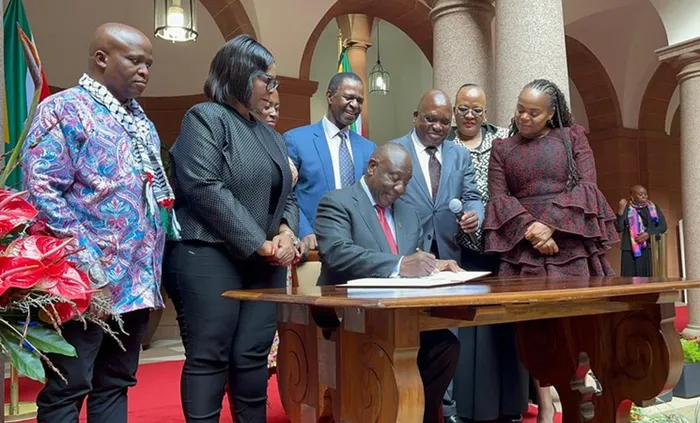NHI’s weak pulse is better than no pulse at all: We accept it won’t be flawless at first

Big deal: Cyril Ramaphosa signing the NHI Bill into law. Picture: Kamogelo Moichela / IOL /
Now that the president has breathed life into the National Health Insurance Bill, it’s time to nurse it into wellbeing.
The idea behind the NHI is noble, but as I have said before, the doubters, critics and naysayers shouldn’t be ignored.
They are concerned that the fund will be centrally managed, with the health minister having the final say over how funds are allocated.
Given our politicians’ penchant for corruption, that is of course a genuine worry.
With all the examples we have to go by, it is needless to say that R300 billion is a huge temptation for long fingers.
The NHI is also causing much consternation in the medical fraternity especially.
The truth is, if successfully implemented, the NHI could spell the beginning of the end for medical insurance and medical aid schemes, which have been ruling the quality healthcare roost for decades.
The fact is, doing nothing is not an option.
Calling our split healthcare system a form of Apartheid, isn’t far off the mark.
The majority of us dare not fall seriously ill, or risk exposure to a public healthcare system that is overstretched and seriously wanting.
I have attended clinics where frail people who should be resting at home, are forced to spend an entire day sitting on hard benches, while waiting for rushed service.
Then they are often told to return, by dispassionately, stressed-out staff with annoyed tones in their voices.
There are few things sadder than seeing a sleep-deprived young doctor, who is desperately tired, but forced to pull another shift at another clinic.
They deserve better, and so do we.
So I don’t agree with those who believe we should repair what we have and continue the status quo.
Those people haven’t had to spend hours in a day hospital, hungry and too scared to go pee, just in case the dispensary calls out your name and you’re not present.
On the other end of this spectrum is a system dedicated to exceptional customer service and the respect and wellbeing of patients, who pay through their teeth for it.
In all fairness, I have noticed the quality that private healthcare was known for slipping over time, in favour of healthy profit margins for their investors.
Just have a look at how well the share prices of private hospital groups are doing worldwide these days.
At the same time, the sort of complaints people have about some government hospitals are now increasingly emerging about some private hospitals.
Sloppy service, staff shortages, uncaring nurses, misdiagnosing doctors, surgery mishaps, hygiene issues, and many more.
At the same time, government facilities, like Groote Schuur have been pulling up their socks and polishing their reputations, in many departments outshining their private counterparts.
These are interesting observations that I will delve deeper into on another day.
Meanwhile, our Health Minister has had a reassuring tone, talking about a pooling of resources between the private and the public health sectors, which he says will lead to the two complementing each other; in theory anyway.
But the fear of looting the coffers persists.
I think that fear can be mitigated by the people placed on the board of the NHI Fund; I’m thinking retired judges and doctors, a nurse, a common patient and a few professionals of course.
That sort of oversight could result in good balance.
Am I concerned that the president signed the bill into law hurriedly ahead of the elections?
Yes of course I am. Like I am concerned about any sudden achievements that are highlighted through intense publicity.
These are obviously planned to be part of a strategy to sway voters, a bit like our collective understanding of why we haven’t had load shedding in almost two months.
Most people wouldn’t be at all surprised if load shedding returns on 30 May - the day after the elections.
But none of that really matters.
What matters is whether the NHI is a net good or a net bad for society. And by net good, we accept that it won’t be absolutely flawless at first.
There will be niggles that will need to be ironed out over time.
I think most people hope that it eventually works the way it is intended to, leading to equal, quality healthcare for all.
I believe it would’ve had a greater chance of success if the ANC consulted more broadly and secured buy-in from all parties.
But we definitely shouldn’t throw the new-born baby out with the bath water.
The NHI has got many critics and detractors who say it won’t work, for many reasons, some of which need to be addressed.
But I say, I would rather have an imperfect NHI that we can perfect as we go, than to have no NHI at all. Because income shouldn’t determine whether you live or die.
Related Topics: